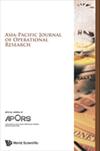具有拒绝和不可用间隔的单机调度最小化最大交货完成时间加总拒绝成本
IF 1
4区 管理学
Q4 OPERATIONS RESEARCH & MANAGEMENT SCIENCE
引用次数: 0
摘要
在本文中,我们考虑了具有拒绝和不可用区间的单机调度。研究了两种类型的不可用间隔,即机器不可用间隔(MNA)和操作员不可用间隔。目标是最小化已接受作业的最大交付完成时间和已拒绝作业的总拒绝成本之和。针对这两个问题,分别提出了伪多项式时间动态规划算法和全多项式时间近似方案(FPTAS)。本文章由计算机程序翻译,如有差异,请以英文原文为准。
Single Machine Scheduling with Rejection and a Non-Availability Interval to Minimize the Maximum Delivery Completion Time Plus the Total Rejection Cost
In this paper, we consider the single machine scheduling with rejection and a non-availability interval. Two types of non-availability intervals are studied, namely the machine non-availability (MNA) intervals and the operator non-availability (ONA) intervals. The objective is to minimize the sum of the maximum delivery completion time of accepted jobs and the total rejection cost of rejected jobs. For these two problems, a pseudo-polynomial-time dynamic programming algorithm and a fully polynomial-time approximation scheme (FPTAS) are proposed, respectively.
求助全文
通过发布文献求助,成功后即可免费获取论文全文。
去求助
来源期刊

Asia-Pacific Journal of Operational Research
管理科学-运筹学与管理科学
CiteScore
2.00
自引率
14.30%
发文量
44
审稿时长
14.2 months
期刊介绍:
The Asia-Pacific Journal of Operational Research (APJOR) provides a forum for practitioners, academics and researchers in Operational Research and related fields, within and beyond the Asia-Pacific region.
APJOR will place submissions in one of the following categories: General, Theoretical, OR Practice, Reviewer Survey, OR Education, and Communications (including short articles and letters). Theoretical papers should carry significant methodological developments. Emphasis is on originality, quality and importance, with particular emphasis given to the practical significance of the results. Practical papers, illustrating the application of Operation Research, are of special interest.
 求助内容:
求助内容: 应助结果提醒方式:
应助结果提醒方式:


